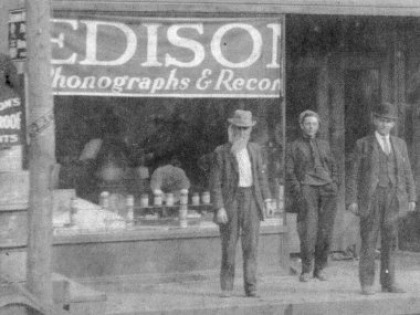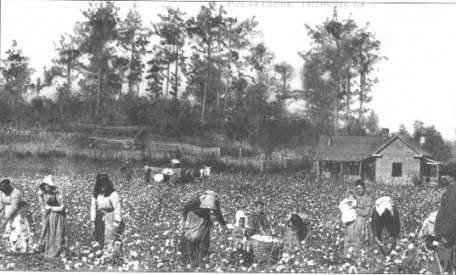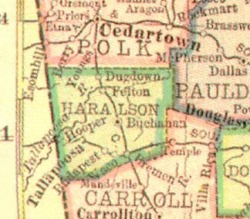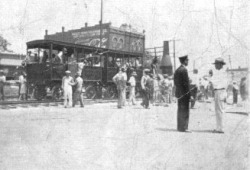Music a Century Ago
The Sanford-Wade Heritage House was originally to have been dedicated in a ceremony on 15 September 2007 at the annual fall Fair on the Square in Buchanan. Logistical issues led to a cancellation of the dedication.
Buchanan Mayor (Jan. 1906 - Jan. 1907) Joel Phillips (left) and two others in front of the phonograph shop on the eastern side of the Buchanan town square, in which Mr. Philllips probably had part ownership; the business later went bankrupt.
Part of the ceremony might have featured the performance of 25 minutes of recorded music from a century ago, the collection of musical pieces annotated and linked below, digitized from original Edison-technology audio-recording cylinders by the Cylinder Preservation and Digitization Project, courtesy of the University of California at Santa Barbara.
This musical program amalgamates two themes. First is the cotton-based economy which still characterized the rural South in these days. Second is the transportation revolution in the industrialized world, which was finally allowing people to travel to places and at speeds never before possible, enabled by recent vehicle advances like the light-rail "car" (streetcar/trolley), the automobile and most dramatically, the airplane.
This musical program amalgamates two themes. First is the cotton-based economy which still characterized the rural South in these days. Second is the transportation revolution in the industrialized world, which was finally allowing people to travel to places and at speeds never before possible, enabled by recent vehicle advances like the light-rail "car" (streetcar/trolley), the automobile and most dramatically, the airplane.
Harvesting cotton in the county circa 1904 or earler
Of course, as related in the 1901 book A Preliminary Report on the Roads and Road-building Materials of Georgia, transportation in Haralson County at the turn of the century was far from the cutting edge:
|
HARALSON COUNTY
Area, 269 square miles; total road-mileage, 200; number of miles of graded road, 0; number of miles of macadamized road, 0; amount of money annually raised for public-road purposes, 0. The roads are constructed and maintained by statute labor. ...little interest seems to have been manifested in the country, so far, in the betterment of highways. The county has in the last few years constructed four iron bridges at a total cost of $12,000; but, otherwise, there has been little or no money expended upon the roadways. The roads are kept up solely by statute labor. Each person, subject to road-duty, is said to work on the public roads, on an average of six days per annum. |
Haralson County, 1904
|
Nonetheless, as early as 1905 the automobile arrived in the county, as detailed in the article here.
|
A street car from Tallapoosa's late Victorian boom times. Historic photos like this have been compiled in a book, available here.
|
Even before the century turned, Buchanan's neighbor town of Tallapoosa could boast streetcar lines during its boom years: The Dummy Line ran from the Georgia Pacific Railroad depot along Atlanta Street to Head Avenue, then to Mill Street, then Alewine, reaching the Lithia Springs Hotel before arriving at the industrial section on the eastern side of town. It then looped back to the depot, taking Atlanta Street, then Michigan Avenue and finally High Street. Another local rail-line ran between between town and a gunpowder mill near the Adderhold Bridge on the Tallapoosa River, using a steam locomotive to pull several cars, while in town mules provided traction.
|
The music of a century ago reflects not only the technologies of its time, but also its social attitudes, including race relations very different from those common now. One might, as a matter of taste, elect to evade the issue; but one cannot deny that the recordings themselves were made. The musical pieces below are hardly the most provocative one might have chosen to include, but archaic (and potentially insulting) words like coon and darkie can be found in the lyrics.
But even in those times, things were starting to change. Years earlier, the advisors of the future King Edward remarked on his unusual habit of treating all people the same, regardless of their social station or color. Edward wrote, complaining of the treatment of the native (Asian) Indians by British officials: "Because a man has a black face and a different religion from our own, there is no reason why he should be treated as a brute." And he specifically deprecated use of the word nigger as "disgraceful."
In this country, President Theodore Roosevelt, the son of a Lincoln-supporting New York father and a mother raised in a Georgia family owning slaves, broke the "color line" by inviting African-American leader Booker T. Washington to be his guest at the White House. And Roosevelt's hand-picked successor, William Howard Taft, running for office at this time, took note of his party's support for the ideal of color-blind justice, as exemplified in this 1908 voice recording. Notably, unlike Georgia as a whole, the majority in Haralson County voted to elect both Roosevelt and Taft in those days.
But the road to the type of society which typical Americans support today would not be a direct one. Taft's immediate successor would "redeem" not only the White House - but the entire national capital district - from black-white racial integration.
Also at this time, the United States as a whole was experiencing its second great wave of European immigration - and dealing with the challenges that it imposed. While Haralson County received Central European ethnics during the Tallapoosa boom years, Georgia scarcely saw this influx, except through the prism of the media, such as this ironic song of 1911.
The sound recordings on the next page - made in an age before broadcast radio or talking cinema - gladly supplement the singing voice and musical instrument with a variety of audio special effects, delighted in the ability to do so affordably through the cost amortization offered by the mass production of audio cylinders.
Proudly powered by Weebly



